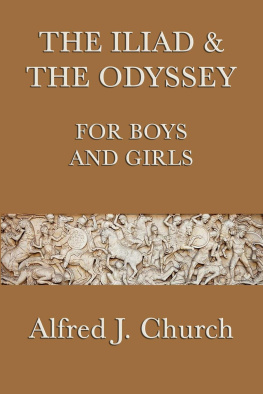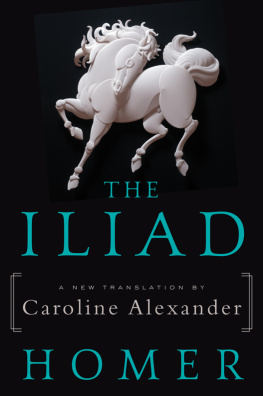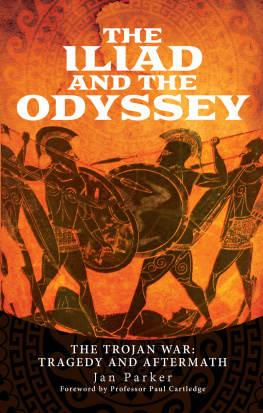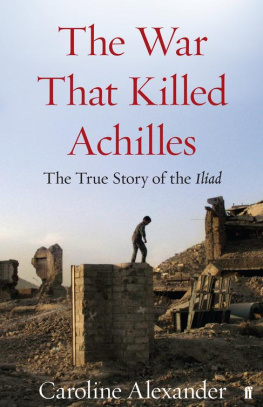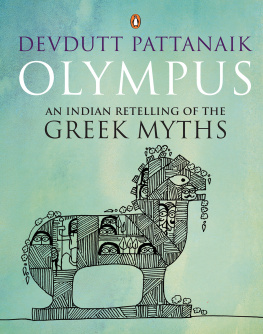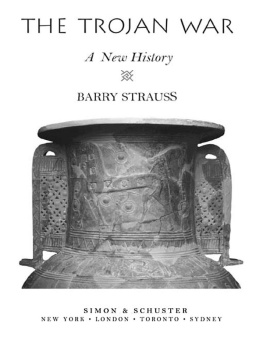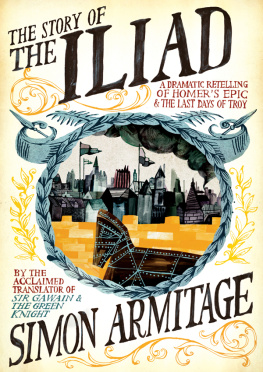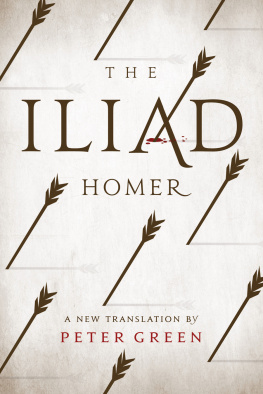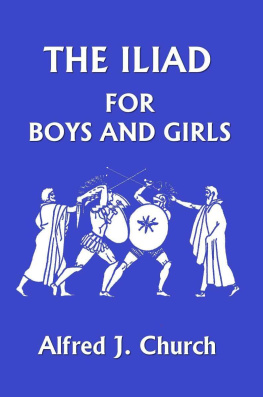BY ROBERT FITZGERALD
TRANSLATIONS
The Odyssey
The Aeneid
Oedipus at Colonus
Chronique (St.-John Perse)
Birds (St.-John Perse)
(with Dudley Fitts)
Oedipus Rex
Antigone
Alcestis
POEMS
Poems (1935)
A Wreath for the Sea
In the Rose of Time
Spring Shade
THE ILIAD
HOMER

THE ILIAD
Translated by Robert Fitzgerald
Introduction by Andrew Ford

Farrar, Straus and Giroux
18 West 18th Street, New York 10011
This edition copyright 2004 by Farrar, Straus and Giroux
Translation copyright 1974 by Robert Fitzgerald
Introduction copyright 2004 by Andrew Ford
All rights reserved
Distributed in Canada by Douglas & McIntyre Ltd.
Printed in the United States of America
Originally published in 1975 by Anchor Books, a division of Random House, Inc.
Published simultaneously in hardcover and paperback by Farrar, Straus and Giroux in 2004
First Farrar, Straus and Giroux edition, 2004
Library of Congress Catalog Card Number. 2003116369
Paperback ISBN-13: 978-0-374-52905-5
Paperback ISBN-10: 0-374-52905-1
www.fsgbooks.com
7 9 10 8
For Sarah,
and for Ughetta, Benedict, Maria,
Michael, Barnaby, and Caterina
Contents
Note
Line numbers at the top left of each right-hand page refer to the Greek text. The right-margin numbers correspond to the lines of the English translation. A few lines that seem wrong or out of place have been omitted from the translation. These are:
Book One, line 296.
Book Eight, lines 73 and 74, 550 through 552.
Book Nine, line 416.
Book Ten, lines 191, 409 through 411, 497, 531.
Book Twelve, line 372.
Book Fourteen, line 269.
Book Fifteen, line 481.
Book Sixteen, lines 614 and 615.
The translator gratefully acknowledges help in the form of fellowship grants from the Bollingen Foundation, the John Simon Guggenheim Memorial Foundation, and the National Endowment for the Humanities. Sally Fitzgerald was a close and invaluable critic of the entire work in progress. Until his death in 1968, Dudley Fitts gave the translation his strict and exhilarating attention. Penelope Lauranss taste and discernment enhanced the quality of the final manuscripts. The enthusiasm of the translators children, and their observations, cheered him often.
Of friends who commented on drafts of the work, Cedric and Anne Whitman read and listened to strategic sections and were munificent with their learning and love of Homer; Mason and Florence Hammond were hospitable auditors and critics throughout; George Lord made helpful notes on several books. The translator is greatly indebted to other friends whose kindness to him and faith in his work sustained him.
On the part of Anchor Books, Anne Freedgood, William Whitehead, and Carolyn Hart were invariably sympathetic and attentive. The translation could not have been undertaken or carried on without the support of the English and Comparative Literature Departments of Harvard University.
INTRODUCTION
The Iliad and the Anger of Achilles
The Iliad is both a landmark in the history of literature and a relic of its prehistory, so that to read it today is to encounter two masterpieces of ancient narrative at once. The first and more familiar is The Iliad as the Song of Troy (the meaning of Iliad), a classic text that stands at the beginning of a Western epic tradition more than twenty-five centuries old. The other work is the Anger of Achilles, which is how the poem titles itself in its first line; this was a long, orally performed song of ancient heroes, one of many that had been sung in Greece and the Near East since time immemoral. We cannot be sure why, out of all these songs, the Anger of Achilles was selected to be written down and handed on to posterity; it appears not to aspire to be the song of Troy, for its story is restricted to a few weeks toward the end of that very long war, and not even the final weeks at that. But the song is certainly ambitiously made: it manages both to recall the tangled events that preceded its story and to evoke the great destruction imminent at its end. The Anger of Achilles became The Iliad because it suggests, despite its focus on a single episode in Akhilleus meteoric life, the utter devastation of the Trojan War and gives it meaning through the eyes of its hero. Robert Fitzgeralds subtle and strong translation brings out the grave tones of the original, and is exemplary in helping us follow its sustained intensity of focus alongside its massive comprehensiveness.
The Greeks themselves had already canonized The Iliad by the fifth century B.C. (when the title Iliad is first attested). In the high-classical culture of Athens, The Iliad, along with its sequel, The Odyssey, was memorized by schoolboys, performed to vast audiences in public arenas, and studied closely by scholars in lectures and monographs. When Greece fell under the sway of Rome in the third and second centuries, The Iliad began its metamorphosis from great national epic into the first poem of Europe. The philhellenic elites of the Roman Empire, for whom
Homer has often been called the father of Western literature, but history is never so neat. Tracing literary traditions to individual inventors not only oversimplifiesThe Iliad is far from being the oldest epic in the worldbut obscures the amazingly rich and complex traditions that lie behind the work. Homers poem is an old one with some undeniable quirks and lapses. There are, for example, certain difficulties in detail, such as the hero Pylaimns, who is killed in the fifth book but pops up alive again in Book XIII; such Homeric nods are now understood as the result of the difficulties of fixing flexible oral traditions into a text. But other episodes in the poem are curiously motivated, as if they had been transferred from another context, and there are a few downright puzzles that are best explained as resulting from a poet coping with contradictory traditions. The special demands of oral performance also account for the fact that Homers style tolerates a good deal more repetition in phrasing and scene construction than modern readers are used to. Locating the epic in its place and time, then, can prepare readers for Homers expansive and sometimes allusive mode of storytelling, and for the special flavor of his traditional language. To put The Iliad in its historical contexts also makes it at least as fascinating as when it is seen as the product of a single artistic genius. In fact, the two perspectives are finally inseparable: serving as a repository of the past in an unlettered culture, the singer of epic aspired to be traditional, to retell the oldest stories without obvious novelty or idiosyncrasy; yet these same traditions were so profuse and so many-sided in their meanings that only the strongest poetic vision could have wrought from them the definitive shaping that is The Iliad.
Epics Before Homer
On most estimates, The Iliad as we know it first came into shape sometime between 750 and 650 B.C. The traditional nature of the epic language makes it hard to date precisely, and some scholars are pushing it toward the sixth century.been debated since antiquity, but need not concern us here. What is very clear is that
Next page

